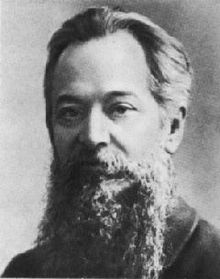| This article includes a list of general references, but it lacks sufficient corresponding inline citations. Please help to improve this article by introducing more precise citations. (February 2011) (Learn how and when to remove this message) |
| Nikolai F. Danielson | |
|---|---|
 Danielson Danielson | |
| Born | (1844-02-07)7 February 1844 Moscow, Moskovsky Uyezd, Moscow Governorate, Russian Empire |
| Died | 13 July 1918(1918-07-13) (aged 74) Petrograd, Russian SFSR |
| Nationality | Russian |
| Other names | N-on, Nik-on, Nikolai-on |
| Occupation(s) | Economist and sociologist |
Nikolai Frantsevich Danielson (Russian: Никола́й Фра́нцевич Дание́льсон; also known as N-on, Nik-on, Nikolai-on; 7 February 1844 – 13 July 1918) was a Russian socio-political figure, economist, publicist, and one of the theoreticians of liberal populism. He is also famous for his translations of Das Kapital by Marx, and being a writer on Russian economic development.
Early life
Danielson was of Finnish [fi; ru] descent. He graduated from Commercial School in St. Petersburg, and later attended lectures in St. Petersburg's university.
In the 1860s Danielson worked at the St Petersburg Mutual Credit Association. Mutual credit associations were then often associated with utopian and social reform politics, and during that period, he became involved in radical political circles and took interest in one of the populist narodnik movement.
Economic Writings and Translation of Das Kapital
In 1872, Danielson published the first Russian translation of volume 1 of Das Kapital by Karl Marx. The translation had been initiated by Mikhail Bakunin before Bakunin's break with Marx and had been continued by German Lopatin. While completing the translation, Danielson initiated a correspondence with Karl Marx and Friedrich Engels, which continued for the rest of their lives. Danielson also translated volumes 2 and 3 of Das Kapital, which were published in 1885 and 1896. In 1880 Danielson published the article "Studies of Our Post-Reform Economy" in issue 10 of the journal Slovo. Marx, who had taught himself Russian, commended it and encouraged Danielson to expand it into a book, which Danielson subsequently did. That book, bearing the same title, appeared in 1893. The book and the article on which it was based contained extensive statistical material on Russia's economic development.
Views on Marxism
Danielson regarded himself as a Marxist, but was criticized by the self-proclaimed "orthodox" Marxists Georgi Plekhanov, Vladimir Lenin and Peter Struve, among others. Danielson's critics grouped him with populist writers like Vasily Vorontsov and Nikolay Mikhaylovsky. But whereas Vorontsov claimed that the development of industrial capitalism in Russia was impossible for lack of markets and Mikhailovsky thought that it was possible but undesirable and preventable. Danielson argued that capitalist industrialisation was already well under way in Russia by the 1890s. The "orthodox" Marxists agreed with him in this. However, in the 1890s, Plekhanov, Lenin and their associates argued that capitalism in Russia must follow essentially the same course as capitalist development in Western Europe. Danielson believed that the "capitalist stage" of development could be foreshortened in Russia, since Russia's late development would allow it to adopt the latest western industrial technology without having to undergo the social evolution that had first produced it in the West. This theory went back to A.I. Herzen and N.G. Chernyshevsky and strongly influenced the theoreticians of the Socialist-Revolutionary Party (PSR), such as Victor Chernov. It also anticipated Leon Trotsky's theory of "uneven and combined development". Danielson argued that capitalism was essentially dispensable for further economic development, and that industrialisation could continue on the basis of a socialist economy. Like the narodniks, he saw the surviving peasant village communes as potential nuclei for a socialist organisation of the Russian economy. Plekhanov and Lenin denounced this as dangerous utopianism.
Political Involvement
In the early 1900s, Danielson was briefly involved with the Russian Socialist-Revolutionary Party, but he did not play a very active role in it, and he withdrew after the "Azef affair" of 1908. (Yevno Azef was a prominent leader of the PSR and the chief of its terrorist organisation; in 1908 he was unmasked as a double agent for the Okhrana, the secret police.) Danielson seemed to have played no role in the Russian Revolution of 1917.
References
- "Даниельсон Николай Францевич".
- White, James D. (2001-03-13). Lenin: The Practice and Theory of Revolution. Palgrave Macmillan. ISBN 9780333985373.
- "Госдума одобрила продажу Финляндии Дома Даниельсона в центре Петербурга". Delovoy Peterburg (in Russian). 26 January 2018. Retrieved 24 November 2023.
- "Даниельсон Николай Францевич".
- Mullin, Richard (2015-04-09). The Russian Social-Democratic Labour Party, 1899‒1904: Documents of the 'Economist' Opposition to Iskra and Early Menshevism. BRILL. ISBN 9789004272149.
- Zverev, V., N.F. Danielson, V.P. Vorontsov: Dva portreta na fone russkogo kapitalizma. Moscow, 1997.
- The Great Soviet Encyclopedia, 3rd Edition, Moscow, 1970–1979
- Von Laue, Theodor H., "The Fate of Capitalism in Russia, the Narodnik Version." American Slavic and East European Reviev XIII (1954), 11–28.
- Walici, A., The Controversy over Capitalism: Studies in the Social Philosophy of the Russian Populists. Notre Dame UP, 1989.
- Eaton, Henry, "Marx and the Russians." Journal of the History of Ideas (1980), p. 89.
- Fedayashin, Anton A., "Humane Modernization as a Liberal Ideal: Late Imperial Russia on the Pages of theHerald of Europe, 1891–1904." The Historian Vol. 71 (no. 4), 2009, pp. 780–804.
- Lenin, V. I. “Po povodu tak nazyvaemogo voprosa o rynkakh.” Poln. sobr. soch., 5th ed.. vol. 1. pp. 95–96, 98, 104, 119–20.
- Lenin, V. I. “Ekonomicheskoe soderzhanie narodnichestva i kritika ego v knige g. Struve.” Ibid., vol. 1.
- Lenin, V. I. “Chto takoe ’druz’ia naroda’ i kak oni voiuiut protiv sotsial-demokratov?" Ibid., vol. I, pp. 218–19, 243, 280, 282–83, 320–21. 335–38.